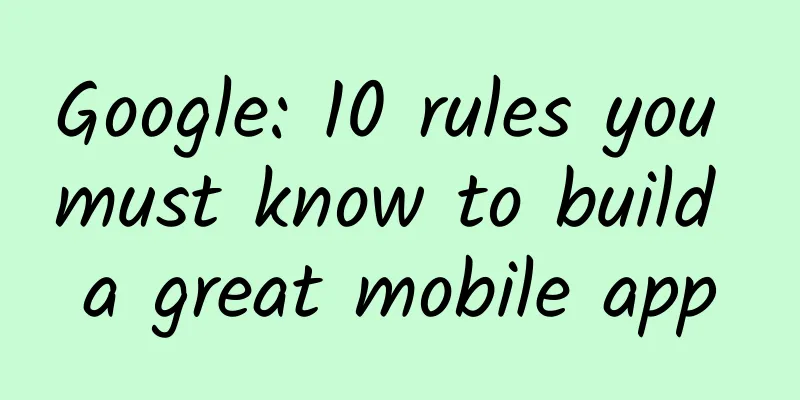Can smart speakers snatch the spotlight from TVs as candidates for the living room economy?

|
Although the status of television is no longer what it used to be, smart TVs still attract the attention of giants such as Tencent and Alibaba, thanks to their promising future as a candidate for the living room economy. As mobile Internet is declining, TV, as the most important screen in the living room, is expected to generate huge business opportunities in the post-mobile Internet era. Originally, this was a good plan, but unfortunately, man proposes, God disposes. A surprise appeared halfway through - the smart speaker. Since Amazon launched the smart speaker Echo in 2014, a battle for the smart speaker market has begun. Foreign giants Google, Apple and Microsoft have also recently launched their own smart speakers such as Google Home, HomePod and Invoke. In China, after JD.com launched the Ding Dong speaker at 599 yuan and Alibaba launched the Tmall Genie at 499 yuan, Xiaomi priced its "Xiao Ai" smart speaker at 299 yuan. Why can the popularity of smart speakers challenge the status of smart TVs, and who will become the best interpreter of "living room economy" in the future? The two sides are at loggerheads: their postures are different, but their ambitions are the same Logically speaking, one makes speakers and the other makes televisions, so they should not interfere with each other. However, in the era of artificial intelligence and the widespread application of voice recognition technology, the two are in a naked competitive relationship. For smart TVs that have evolved into artificial intelligence TVs, the only perceptible selling point is voice recognition technology. Smart TVs with voice recognition technology will have a more imaginative business prospect in the future and will be regarded as the interpreter of the living room economy or even the entrance to the home Internet of Things. After voice recognition technology is fully applied to televisions, TVs will become the "central control center" for the family. For example, the user's voice can be directly stored as an ID by the system, and the operating system extension can realize multi-scene and multi-intelligent voice control, such as smart washing machines, smart refrigerators, smart air conditioners, etc., which can be extended with the TV as the center. As for smart speakers, they also hope to use voice recognition technology to build themselves into the entrance of the living room economy. In the final analysis, it is because smart speakers can take on the responsibilities of a family butler, act as a secretary, buy groceries and order takeout, open and close curtains and air conditioners, etc., and at the same time take into account entertainment functions such as speakers. Like smart TVs, they can radiate the surroundings as dots. Not only that, compared to the 1.0 product of smart home APP, smart speakers should be hardware in the smart home 2.0 era, which has three characteristics: human-computer interaction, intelligence, and life-oriented. From the above three basic characteristics, we can say that the hardware that integrates various artificial intelligence technologies and integrates third-party services is the entrance to smart home rather than the entrance to smart speakers. Whether it is an artificial intelligence TV or a smart speaker, it can bring assistant services, and both have the ambition to integrate the entire home Internet of Things. In the current smart home system, most products are still in a state of separation. In the domestic family environment, there are also few families whose home appliances are all systematic products under a brand. According to a report released by market research consulting firm Markets and Markets, the global smart home market size will reach US$122 billion in 2022. Such a huge market, and the current market structure is still unclear. If smart speakers or smart TVs really become the "control center" of smart homes in the future, they will become the biggest beneficiaries of the entire smart home field. Therefore, although smart TVs and smart speakers have different ways of serving users and provide different entertainment content, their future profit directions are the same. If smart speakers can grow, they will inevitably take up the market share of smart TVs, and their business prospects will also be limited. The giants’ wishful thinking: Rather than betting on the war, it is better to go into battle bare-handed Regarding the living room economy, when smart speakers were not yet popular, giants had already made heavy deployments. Internet giants such as Tencent and Alibaba have all made strategic investments in the smart TV field. However, they are now going from betting on the living room economy to going into battle bare-handed. The main reasons are as follows. 1. The industry is virgin land, and the window effect is significant. It was Amazon that ignited the smart speaker war, and domestically, it was JD.com and Alibaba. We will find that these companies are shopping-type e-commerce platforms, and none of them have smart TVs. Since they missed the wave of smart TVs, the market is now heating up smart speakers, which is equivalent to an opportunity to buy a new ticket, and naturally they are unwilling to miss it. Moreover, when the industry is booming, it is easier to cultivate user market consumption habits. Taking advantage of this wave of enthusiasm, it can be quickly converted into sales, and the window effect is significant. The smart speaker industry is still in its early stages of development. At this point in time, users have no brand awareness at all. Unlike the air-conditioning industry, where Gree is recognized as the leader, and the smart phone field, where Apple is recognized as the dominant player, these e-commerce platforms are in a period of brand chaos. Relying on their own user base and extensive publicity, they are likely to take advantage of the first-mover advantage. Moreover, there are not many well-known brands in the traditional speaker industry. Even if they focus on smart speakers, their brand recognition is not as eye-catching as brands such as Alibaba and JD.com. Moreover, the core of smart speakers is not the speakers, but AI and voice recognition. Traditional speakers do not have an advantage here either. 2 The threshold for smart speakers is much lower than that for smart TVs. Among the giants in the field of smart TV, Tencent, as a recognized software company, has made great efforts in the field of smart TV hardware. It first launched Penguin TV, but after failing to gain market share, it invested huge amounts of money in Coocaa and Thunderbird. From Penguin TV, we can see that the threshold of smart TV is high. Even though Tencent's social empire is huge, it is not easy to get into the field of smart TV. The TV industry has been developing for decades, and there are giants such as Skyworth, TCL, Haier, and Hisense. Users already have brand awareness when purchasing smart TVs, and the only way to enter the market is to invest in shares. In addition, smart TVs involve issues such as radio and television licenses and movie copyrights, but smart speakers are different. They are completely market behaviors and the government will not interfere. Moreover, music copyrights are relatively easier to handle than movie copyrights. Baidu has Baidu Music, Tencent has QQ Music, NetEase has NetEase Cloud Music, and other giants such as Alibaba can squeeze into the market by acquiring shares even if they do not have music products. Smart speakers do not have a dense industry chain like smart TVs. As smart TV screens get bigger and bigger, the supply chain management capabilities of panels are put to the test. This alone has stumped countless companies. Smart speakers are different. They are small in size, have no panels or small screens, and the speaker industry is relatively mature, as are OEM companies. Hardware manufacturing has become much easier. Internet application and service companies only need to focus on user experience and product design to quickly enter the market. Therefore, as long as you have money and the management capabilities of a giant, you can quickly gain a foothold. 3 From soft to hard, the general trend in recent years. Not only in the field of smart speakers, in recent years, a whirlwind of hardwareization of software companies has been sweeping across various industries. Companies in the niche IT field that make mobile apps or network services have begun to get involved in smart hardware. The more representative ones are the Air Fruit from Moji Weather and the couple bracelets from Jiayuan.com. From a broader consumer electronics perspective, companies that make apps such as Meitu and beauty phones also fall into this category. In addition, software companies are hardware-oriented to prevent themselves from being trapped in an isolated island dilemma. Let’s take smartphones as an example. 360, LeTV and other companies are software manufacturers. Why do they want to make smartphones? And you should know that smartphones are a bloody battle and there is no benefit at all. They are determined to occupy mobile terminals or avoid being marginalized. Many smartphones have launched their own application markets or must-have software to promote their software products through hardware curves. One of the important reasons why Baidu did not become popular on the mobile platform is that the traffic or information on the mobile platform is an isolated island. Baidu's crawler technology on the PC platform cannot crawl it, and it cannot crawl one APP after another. Then it fell behind in the mobile era. The same principle can be used to explain the relationship between software and hardware. For a new hardware platform, if the hardware company is relatively strong and powerful, such as HTC, Sony, AUX, etc. in the past, then an island will be formed. Smart speakers have voice recognition functions. Voice as a medium is the most suitable as the next generation of interaction. When the new platform has not formed a standard, the manufacturer's voice power is very strong, and it is expected to control the next smart terminal market in the future. 4 The cost of trying out new products for users is low, and the long-tail effect provides support. In the past, speakers were only a feature of rich families, but with the development of the times, the technical threshold for speakers has become lower and lower, and the price has also become more affordable. When other smart speakers were still selling for 1,399 yuan, Alibaba and Xiaomi couldn't wait to offer theirs at 499 and 299 yuan. Compared with bulky smart TVs that cost thousands of yuan, smart speakers that cost a few hundred yuan can be replaced without spending a fortune when you want to try something new, which has repeatedly lowered the threshold for purchasing and popularizing smart speakers. Although smart speakers have a small audience, the long-tail effect, coupled with the brand endorsement and fan base of Alibaba, JD.com, and Xiaomi, means a certain sales volume is guaranteed. False fire or real fire: Give "time" some time Smart speakers and smart TVs are in direct conflict, and as time goes by, the conflict between the two is bound to become more intense in the future. So can smart speakers eventually replace or affect the business prospects of smart TVs? From the perspective of user habits, for smart TVs, people basically turn off the TV when they are not watching TV. If the TV is kept on all the time in order to control other home appliances, it is obviously not in line with user habits. Smart speakers are better at handling this contradiction. Smart speakers have no screen and can be in standby mode at any time. They start working after the user gives an instruction. In this respect, smart speakers far exceed smart TVs. However, smart speakers are not as necessary as smart TVs. TVs have a stronger presence. Do we have to buy such a non-essential item just to achieve smart life? Instead of this, wouldn’t it be more convenient to use TV as the control center? In the past, speakers were mostly accessories for TVs and computers, but with the advancement of technology, TVs now have surround sound systems, and speakers have gradually become a "burden" for computers that emphasize convenience. Therefore, for users, the demand for speakers is not as great as before. In addition, with the emergence of mobile phones and tablet computers, people have more choices in listening to music. Given the size of speakers and the troubles caused by music amplifiers to the surroundings, people are more willing to plug in headphones to listen to their own music and enjoy their own music world. Moreover, most people in China do not have much requirements for sound quality, so the existence of speakers has become dispensable. For these people, a mobile phone or tablet computer can completely replace speakers. Given that speakers are so unnecessary, why not use a smart TV as a control center? This will not only give users more choices, but also better cater to the needs of a family, rather than having the family cater to a product. In addition, in Zhigang's opinion, smart speakers have a more fatal logical drawback: smart routers, as the predecessor of smart speakers, were once highly praised like the current smart speakers, but soon disappeared. In the past few years, the concept of big data has been very popular. Smart routers naturally have the ability to collect data. As an indispensable smart terminal in the home, all kinds of smart home appliances have to be connected to the Internet through smart routers. Therefore, smart routers are also expected to become the entry-level products of the Internet of Things. They have attracted much attention in the past two years. What about now? Is there anyone who still mentions it? Smart speakers and smart routers have the same purpose. Big data is popular, and routers collect text data. Artificial intelligence is popular, and voice recognition is on the rise. Smart speakers collect user voice information. Both have the potential to become the entrance to smart homes. Whether smart speakers can eventually become as popular as smart routers and then return to obscurity remains to be seen. In addition, whether it is the "indigenous candidates" of the living room economy or the "new candidates" such as smart routers and smart speakers, they may all be "lost" in the end. Remember those communication operators? They proposed channels such as 4G networks and broadband, but they have been marginalized and piped in general, and they are not profitable. On the contrary, OTT Internet companies above the pipes are making a lot of money. Everyone is competing for the entrance, hoping to become the "entrance" and "pipeline" in the next high-frequency scenario, but whether they can win in the end is not entirely determined by the early preparations. All "candidates" may face the "Waterloo tragedy". Any giant company is basically betting on future trends, or catching up with the glory and achievements won by the current wave, so they all have an extremely sensitive sense of the future. Now in the smart speaker market, the high-profile influx and tit-for-tat may be the beginning of a new era. Whether it can leverage the future business prospects of smart TVs remains to be seen. The popularity of any hot industry is not just the business of the company itself, but will also have an impact on users. In Zhigang's opinion, it is right for companies to pursue hot spots, but they don't have to put on a "chastity arch" of "if it doesn't work, just treat it as charity", and they just need to avoid causing trouble to geek users and stick to the bottom line and integrity. No matter how smart a smart speaker boasts about its intelligence, or how it describes its business prospects, its most basic function is still a speaker. The first wave of users who bought smart speakers were mostly speaker enthusiasts who might have bought them after hearing about the brand. For this group of people, music enjoyment comes first, followed by intelligence. Just like shared bicycles, the travel needs of users are met first. As for the big data behind it, perhaps ordinary users don’t care. Every time you chase the trend, you are paying an IQ tax. Online news often reverses. For many products, geek enthusiasts and speaker enthusiasts chase the trend, but they still need to meet the demand for speakers. Even if this wave of trend has passed, users can still get a speaker with good sound quality. Although it is the bottom line, now everyone is staring at the value of the Internet of Things entrance. How many people can concentrate on doing the most original function of the speaker? As a winner of Toutiao's Qingyun Plan and Baijiahao's Bai+ Plan, the 2019 Baidu Digital Author of the Year, the Baijiahao's Most Popular Author in the Technology Field, the 2019 Sogou Technology and Culture Author, and the 2021 Baijiahao Quarterly Influential Creator, he has won many awards, including the 2013 Sohu Best Industry Media Person, the 2015 China New Media Entrepreneurship Competition Beijing Third Place, the 2015 Guangmang Experience Award, the 2015 China New Media Entrepreneurship Competition Finals Third Place, and the 2018 Baidu Dynamic Annual Powerful Celebrity. |
Recommend
How to revive an old Douyin account? What issues should you pay attention to?
Every day, many Douyin video users register new a...
A "new" chemical element, want to "get into the pit" of the periodic table? It's not that easy!
Recently, researchers from the Institute of Moder...
iPhone 6S battery has shrunk! What about battery life?
At the press conference, Apple did not announce t...
There are 6 ways to create a brand story that will spark discussion
New Balance tells a story about Li Zongsheng'...
Behind the 260 million yuan fine: How did Qvod become a rogue platform?
It seems impossible for Qvod to be reborn. It was...
There are many pitfalls on the road to treating hair loss. Why is it so difficult to grow hair?
Author: Zhang Jianzhong, Chief Physician, Peking ...
I'm curious about whether girls use their hands or something else to solve physiological problems.
Whose cat doesn’t go into heat, and whose girl do...
Analysis of explosive advertising materials and landing pages!
The more exaggerated, the more explosive? Totally...
Microsoft exec says Xbox One was made for shooters
Although Wii U, PlayStation 4 and Xbox One are of...
Super cool! 10 km vertical take-off and landing return flight, my country's reusable rocket has made a new breakthrough!
At noon on September 11, China's independentl...
IoT devices will surpass smartphones in 2018
In today's era, the hottest device in the har...
In 2020, how to use short videos to empower brands?
We have been engaged in marketing for ten years a...
The Infernal Affairs and Rashomon between Ctrip and Qunar
Regarding the rumors about the merger between Ctr...
Aite Tribe Administrator Recruitment Order
[51CTO.com original article] Dear developers: 51C...
A proud buttocks "Ao Family Army Military Academy"
A proud buttocks "Ao Jiajun Military Academy...









